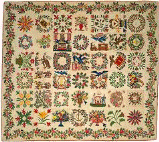Textile Society of America

Textile Society of America: Symposium Proceedings
Date of this Version
2020
Document Type
Article
Citation
Published in Hidden Stories/Human Lives: Proceedings of the Textile Society of America 17th Biennial Symposium, October 15-17, 2020. https://digitalcommons.unl.edu/tsaconf/
doi: 10.32873/unl.dc.tsasp.0128
Abstract
On August 6, 2019, international sanctions on Iran were reintroduced. Through my personal quest to understand the carpet trade, written as an ethnographic exploration, this thesis follows the everyday life trajectories of carpet traders in the context of Iran, the Netherlands, Belgium, and Germany. These life trajectories are made comprehensible based on the themes: Kinship Ties, Moral Economy, and Everyday Diplomacy. In doing this, it contributes to the understanding of global trade networks from the perspective of globalization from below. Few ethnographies are written on the social lives of contemporary carpet traders, but there are many assumptions and opinions on how the trade develops in the face of globalization and geopolitical conflict. Previous research on traders generally considered their activities based on survival strategies. Later research recognized the flexibility, creativity, and skill in their work. In times of international sanctions and the increasing influence of globalization, I use these bodies of literature on trade, kinship, morality, and everyday diplomacy, to explore how the everyday live trajectories of carpet traders are embedded in other life domains, outside the economical. By focusing on the three themes, I show how carpet traders find clever ways to handle geopolitical conflict. Besides, I explore how their actions and the maintaining of their social relations are based on identity, morality, and negotiations about trust and betrayal.
Included in
Art and Materials Conservation Commons, Art Practice Commons, Fashion Design Commons, Fiber, Textile, and Weaving Arts Commons, Fine Arts Commons, Museum Studies Commons


Comments
Copyright © 2020 Felix van den Belt